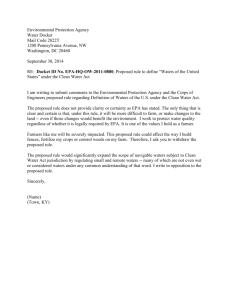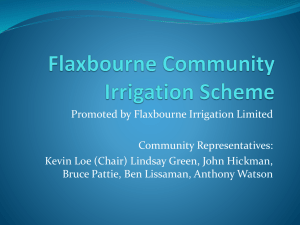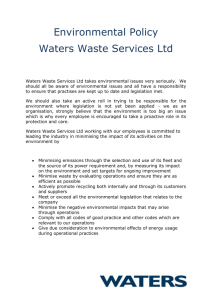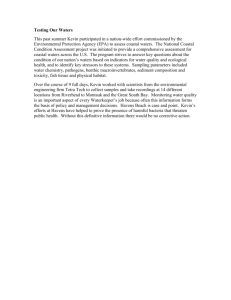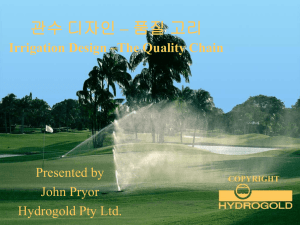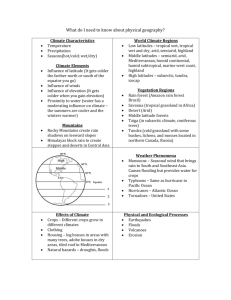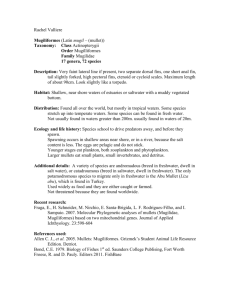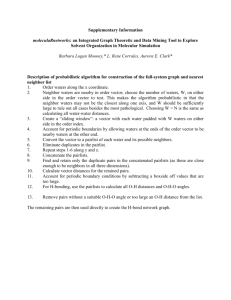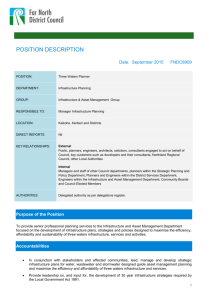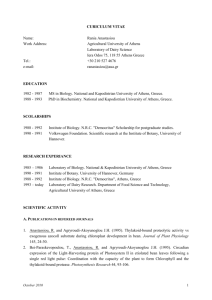Integrated Water Resources Management in Arid and
advertisement
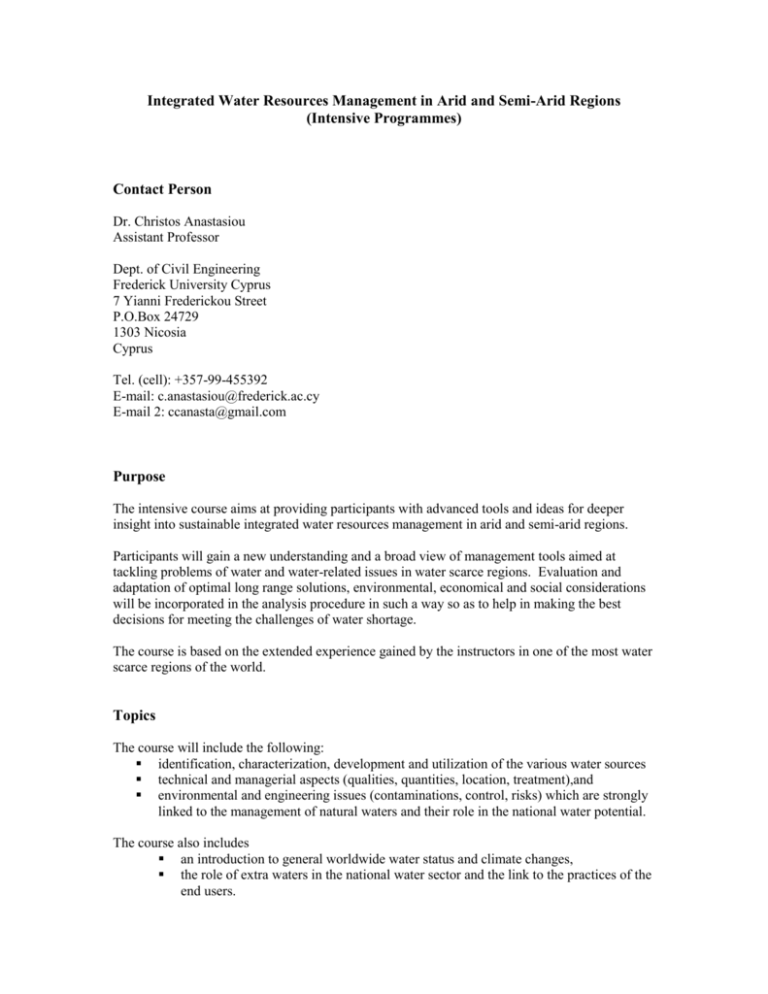
Integrated Water Resources Management in Arid and Semi-Arid Regions (Intensive Programmes) Contact Person Dr. Christos Anastasiou Assistant Professor Dept. of Civil Engineering Frederick University Cyprus 7 Yianni Frederickou Street P.O.Box 24729 1303 Nicosia Cyprus Tel. (cell): +357-99-455392 E-mail: c.anastasiou@frederick.ac.cy E-mail 2: ccanasta@gmail.com Purpose The intensive course aims at providing participants with advanced tools and ideas for deeper insight into sustainable integrated water resources management in arid and semi-arid regions. Participants will gain a new understanding and a broad view of management tools aimed at tackling problems of water and water-related issues in water scarce regions. Evaluation and adaptation of optimal long range solutions, environmental, economical and social considerations will be incorporated in the analysis procedure in such a way so as to help in making the best decisions for meeting the challenges of water shortage. The course is based on the extended experience gained by the instructors in one of the most water scarce regions of the world. Topics The course will include the following: identification, characterization, development and utilization of the various water sources technical and managerial aspects (qualities, quantities, location, treatment),and environmental and engineering issues (contaminations, control, risks) which are strongly linked to the management of natural waters and their role in the national water potential. The course also includes an introduction to general worldwide water status and climate changes, the role of extra waters in the national water sector and the link to the practices of the end users. Other topics will be irrigation, resources contamination and rehabilitation, economic aspects of water distribution and storage introduction to trans-boundary waters and regional agreements. Lecturers The lecturers bring with them enormous practical and theoretical experience and knowledge in all aspects of integrated water resources management in arid and semi-arid regions. Practical examples will supplement the theoretical lectures. Frederick University (Cyprus) Dr. Christos Anastasiou Dr. Christos Anastasiou is an Assistant Professor of Civil (Environmental) Engineering at Frederick University. He holds a B.S. and an M.E. in Environmental Engineering Sciences from the University of Florida, and a Graduate Diploma in Hydrology and Wetlands Science, again from the University of Florida, USA. Upon completion of his PhD at North Carolina State University, USA, in 2002, Dr. Anastasiou worked as an Assistant Professor of Environmental Engineering at the American University of Beirut in Lebanon and as the Academic Director of the Postgraduate Program at the Cyprus International Institute for the Environment and Public Health in association with Harvard School of Public Health. He is also an Adjunct Lecturer of Environmental Engineering at the Harvard School of Public health. His research interests lie in the areas of environmental systems analysis, wastewater treatment, water strategies and water resources management, decision making, and agricultural waste treatment and management. In his research, Dr. Anastasiou focuses on both theoretical aspects and practical issues of the problems and he seeks to incorporate the interdisciplinary aspect of engineering management projects. Dr. Anastasiou has coordinated a number of funded national and international research projects. Dr. Anastasiou was involved in curriculum development for a number of undergraduate and graduate programs. He has extensive teaching experience in schools that include North Carolina State University, the American University of Beirut, and Harvard School of Public Health. Dr. George Michaelides an introduction to general worldwide water status and climate changes, Dr. Maria Anastasiou economic aspects of water distribution and storage introduction to trans-boundary waters and regional agreements. Water Development Department, Ministry of Agriculture, Natural Resources and the Environment, Cyprus To Be Determined the role of extra waters in the national water sector and the link to the practices of the end users. Agricultural Research Institute, Cyprus To Be Determined irrigation, PROGRAM MODULE 1 - Basics of Water Resources and Water Use Opening and Introduction Characteristics of natural water resources in arid and semi-arid regions Water scarcity as a global problem Global climate changes and it effects on natural water resources IWRM – Integrated Water Resources Management – Technical Approach Management of natural water resources Renewable water potential The importance of meteorological, hydrological, geological and quality information Hydrological models and forecasting The integration of natural water resources in national water supply systems Sustainable use of natural water resources in arid and semi-arid regions Flood management in arid regions Drought and floods phenomena; forecasting; reliability and assessment Floods: in open and urban areas Integration of flood water into the water sector activities Resources and end users The population-water resources equation Water Stress, strain and water modulus Basic water demands, domestic, municipal, industrial Water role in serving national interests – agriculture, nature, peace agreements, others Strategic importance of agriculture and its role in the national water demand picture Competition between water consumers on water resources The role of “shadow water” (partly virtual water) in the balancing of the MODULE 2 - Extra Waters, Irrigation Production of new waters Production of new water – world picture Seawater desalination – technologies, costs, environmental problems and related considerations Brackish water desalination – brine disposal alternatives Desalinated water quality issues – mixing with other water resources, linkage with different end users Production of new waters – continued Wastewater – treatment technologies Reuse of treated wastewater (e.g. agriculture, irrigation of parks, industry, municipal use, drinking) Special issues in wastewater reuse Irrigation and efficient use in agriculture Irrigation methods Drip irrigation: on surface and subsurface drip irrigation Reuse criteria of low quality treated waters Green water use Crops selection Irrigation regimes Assessment of water requirements MODULE 3 - Efficient water use, quality considerations Efficient use and reclamation of waters in the industrial and municipal sectors Planning water conservation program Residential and domestic water use Industrial, commercial and institutional water use Potable water quality considerations Drinking water quality criteria Water safety and control Monitoring Emergency situation handling Water resources quality control Water resources pollution and prevention means Legislations and enforcements Treatment of polluted water resources – methods and examples MODULE 4 - Contamination, Regulation, Trans boundary waters Modeling in IWRM – Structure of national water sectors National structure of water sector – case study Jordan National structure of water sector – case study Israel Economic tools and water pricing Water costs Water policy for charge Trans-boundary water Trans-boundary water sources International water laws Trans boundary waters-disputes and resolution Conjunctive use of Trans-boundary water and agreements between countries Summary and discussion Open discussion related to water management issues in different countries
